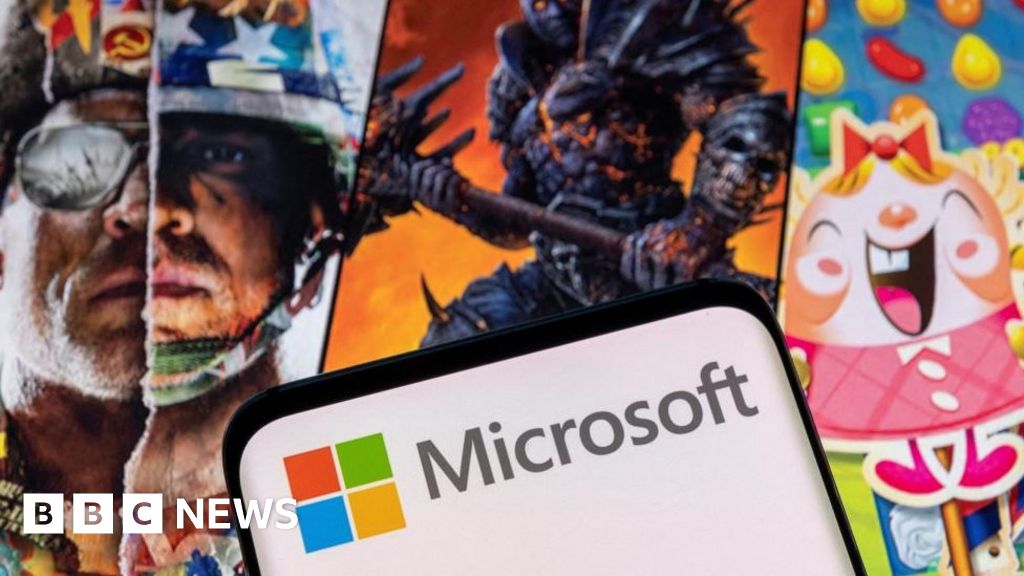US Moves To Block Microsoft's Activision Takeover

The Call of Duty titles have sold more than 400 million copies over the past 20 years
Regulators in the US have asked a judge to block Microsoft from completing its $69bn (£56bn) purchase of Call of Duty publisher Activision Blizzard.
The US Federal Trade Commission (FTC) said the deal, which would be the largest in the history of the video games industry, could "substantially lessen competition" in the sector.
The move comes after the UK blocked the deal over concerns it would hurt competition, but the EU approved it.
A trial in the US will begin in August.
The FTC said in a court filing that a "preliminary injunction is necessary to... prevent interim harm" while the regulator determines whether "the proposed acquisition violates US antitrust law".
Microsoft's proposed takeover of Activision has split global regulators, and in order for the deal to go through the parties need approval from regulatory bodies in the UK, the EU and the US.
The European Commission has approved the acquisition, saying that Microsoft's offer of 10-year free licensing deals - which promise European consumers and cloud game streaming services access to Activision's PC and console games - mean there would be fair competition in the market.
But the UK's Competition and Markets Authority (CMA) blocked the deal in April, saying it was concerned the takeover would offer reduced innovation and less choice for gamers.
Microsoft and Activision hit out at the decision and said they would appeal.
Microsoft president Brad Smith said it marked the company's "darkest day" in its four decades of working in the country.
In response to the announcement by the FTC, Mr Smith said Microsoft welcomed the "opportunity to present our case in federal court" in its attempt to persuade US regulators to allow the deal to be completed.
"We believe accelerating the legal process in the US will ultimately bring more choice and competition to the market," he added.
In December last year, the FTC had asked an in-house administrative judge to block the deal on antitrust grounds, arguing it would give Microsoft's Xbox exclusive access to Activision games, leaving Nintendo consoles and Sony's PlayStation out in the cold.
William Kovacic, former FTC chair and non-executive director at the UK's CMA, said the FTC had expressed concerns that Microsoft and Activision might close their deal despite UK opposition, and so asked a judge to halt it.
"The EU's decision to take a settlement was a bit of a surprise," he told the BBC's Wake up to Money programme
Mr Kovacic said there was still a chance the takeover could be completed, but added "the chance is diminished".
The purchase of Activision, which also makes Candy Crush, is seen to be important for Microsoft, which is trying to play catch-up with its main competitor Sony.
However, this attempted investment from Microsoft could be seen as a play for the future of games, with the firm betting big on its Xbox Game Pass service, which has been described as the "Netflix of games".
Microsoft believes the future lies in players having subscriptions to libraries and streaming games through "cloud gaming", rather than making one-off purchases - which is the main way of accessing games at the moment.
Additional reporting by Kath Paddison
From Chip War To Cloud War: The Next Frontier In Global Tech Competition
The global chip war, characterized by intense competition among nations and corporations for supremacy in semiconductor ... Read more
The High Stakes Of Tech Regulation: Security Risks And Market Dynamics
The influence of tech giants in the global economy continues to grow, raising crucial questions about how to balance sec... Read more
The Tyranny Of Instagram Interiors: Why It's Time To Break Free From Algorithm-Driven Aesthetics
Instagram has become a dominant force in shaping interior design trends, offering a seemingly endless stream of inspirat... Read more
The Data Crunch In AI: Strategies For Sustainability
Exploring solutions to the imminent exhaustion of internet data for AI training.As the artificial intelligence (AI) indu... Read more
Google Abandons Four-Year Effort To Remove Cookies From Chrome Browser
After four years of dedicated effort, Google has decided to abandon its plan to remove third-party cookies from its Chro... Read more
LinkedIn Embraces AI And Gamification To Drive User Engagement And Revenue
In an effort to tackle slowing revenue growth and enhance user engagement, LinkedIn is turning to artificial intelligenc... Read more

